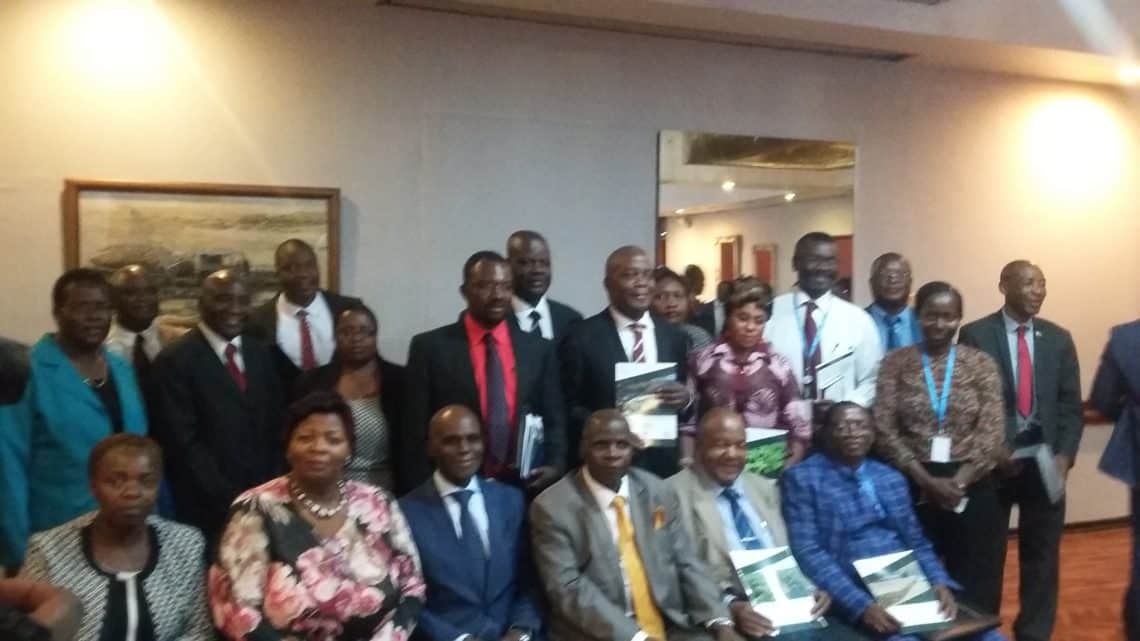By Byron Mutingwende
The government has launched the “district risk profiles” in a bid to ensure a national integrated food and nutrition security information system that provides timely and reliable information on the food and nutrition security situation and the effectiveness of programmes and informs decision-making.
In his speech during the launch at Rainbow Towers Hotel on 31 October 2017, Justin Mupamhanga, the Deputy Chief Secretary in the Office of the President and Cabinet revealed that there was a need for food and nutrition security information system since extreme weather events had recurrently distressed the diverse livelihoods of the rural population in Zimbabwe.
“Compounding factors that include climate change, chronic diseases, high poverty levels, among others, have contributed to increased livelihood vulnerability, food insecurity, chronic poverty and malnutrition at an alarming pace.
“Both acute and chronic food and livelihood vulnerability have increased significantly and have become interconnected and difficult to differentiate. The Government of Zimbabwe and development partners have been looking for disaggregated grounded and credible information that would assist them not only to understand the manifestation of the current food security and livelihood challenges but also that could provide information on the factors, relationships and linkages that compound the current crisis,” Mupamhanga said.
The initiative to profile will synthesise the information in a simple, systematic, usable and easy to understand manner of the various livelihoods components. Mupamhanga said the profiles focus on infrastructure, water and sanitation, communication, livelihoods, poverty, climate, crops, livestock, markets, hazards and shocks, development indicators and priorities, food and nutrition security conditions and recommendations for the 60 rural districts of Zimbabwe.
He said that, under the coordination of the Food and Nutrition Council (FNC) and with the technical assistance of the World Food Programme (WFP), the profiles were generated using sound methods, tools and analytical frameworks.
A multi-stakeholder approach was employed bringing together experts from government ministries, UN agencies, NGOs and local authorities. It is envisaged that the district profiles will lead to programmes that link disadvantaged rural livelihoods to sustainable development pathways building resilience of vulnerable households and communities.
Eddie Rowe, the WFP Zimbabwe Representative and Country Director said the UN agency shares country’s ambitious vision of eradicating hunger and ensuring improved nutrition by 2030.
“The Zero Hunger Strategic Review, launched in July 2015 by the Vice President, was a strong signal of national commitment to pursue this agenda. The District Profiles, which we are launching here today, are another significant representation of this commitment.
“This government-owned document, and in particular the recommendations derived from it, build the baseline to guide all stakeholders in working together to achieve the food and nutrition goals set out in the ZimASSET, the Zimbabwe UN Development Assistance Framework, or ZUNDAF, the 2030 Agenda for Sustainable Development, and indeed, to achieve a Zimbabwe with Zero Hunger,” Rowe said.
The outcomes related to SDG2 on addressing hunger and food insecurity are intrinsically linked to progress in other elements of the Sustainable Development Agenda.
“Ending hunger means ensuring access to nutritious food for the most vulnerable, tackling the multi-dimensional causes of malnutrition, including health and sanitation, and increasing agricultural production through sustainable and resilient food systems.”
A director in the Ministry of Agriculture, Mechanisation and Irrigation Development said the government seeks to promote and sustain a viable agricultural sector through the provision of appropriate agricultural infrastructure, mechanisation, technical research and development, agricultural technologies and infrastructure to ensure food and nutrition security.
Ngoni Masoka, the Permanent Secretary in the Ministry of Public Service, Labour and Social Welfare said in order to fulfil the Sustainable Development Goals, there was need to provide social protection services to vulnerable and disadvantaged groups and enhance child protection.
“Given the prevailing situation, it is imperative to ensure that where social protection, including social assistance programmes, is implemented, it must contribute and enhance the food and nutrition security of the most vulnerable in the short and medium term,” Masoka said.
Stakeholders mandate the Food and Nutrition Council to promote a cohesive national response to household food insecurity and malnutrition as well as to coordinate and harmonise inter-sectoral implementation of food and nutrition relevant policies and programmes.






